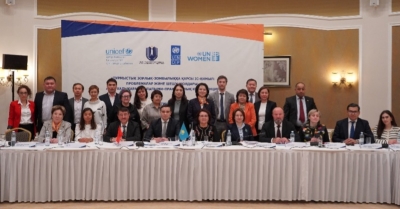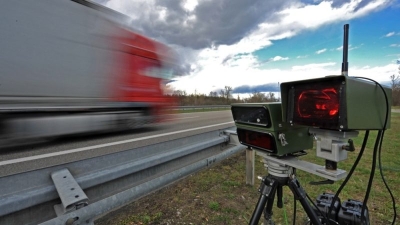The Brief — An air of desperation

International law is sacred unless it applies to migration. That appears to be the message from Europe’s political leaders.
Following Thursday’s EU immigration ministers meeting, the bloc’s Home Affairs Commissioner Ylva Johansson opined that the UK’s new ‘small boats’ legislation, which would allow the UK authorities to detain and return irregular migrants, “might be a violation of international law and the UN refugee convention”.
Yet the rhetoric and political calculation of the EU are not much different. The EU is still determined to cut a migrant control deal with Tunisia, whose autocrat President Kais Saied said several weeks ago that ‘urgent measures’ were needed to combat ‘hordes of illegal migrants’ from sub-Saharan Africa, remarks that prompted a spike in violent attacks against arrivals.
Saied’s comments provoked international censure from the United States and international agencies, though not, curiously enough, from the European Commission.
In a letter to Prime Minister Giorgia Meloni following last week’s shipwreck that killed more than 60 migrants, Commission President Ursula von der Leyen praised Italy’s migration policies, despite widespread criticism that they are heavy-handed and, in some cases, break international law.
The EU also wants to intensify cooperation on migration control with failed-state Libya and Egypt, also an autocracy with a poor human rights record.
There is a strong argument to be made that the UN refugee convention, adopted in 1951, is outdated. The slaughter and displacement of tens of millions during and after the Second World War was of a uniquely horrific scale.
The modern patterns of economic migration and asylum-seeking, predominantly from the Middle East and Africa, are very different in nature and magnitude.
That said, European politicians are guilty of hugely exaggerating the scale of the problem. It defies logic to suggest that an EU capable of supporting four million Ukrainians indefinitely can be overwhelmed by 330,000 irregular arrivals by boat.
In Westminster, Home Secretary Suella Braverman has talked up the prospect of ‘hundreds of millions’ of people wanting to travel to the UK – presumably in reference to the UNHCR’s estimate that there are 103 million forcibly displaced worldwide, though the majority remain within their home countries and have no intention to travel to the UK.
That is the talk of the schoolyard fantasist, not a government minister. Notwithstanding the fact that the UK’s current population is just over 60 million, in 2022, there were 45,000 irregular arrivals by boat. Claiming that this poses some kind of existential threat to the UK is risky and dishonest.
Chaos and incompetence have left Rishi Sunak’s Conservative party 20 percentage points behind in opinion polls and facing a heavy defeat in elections due next year. The illegal immigration bill will surely be challenged in the courts and the House of Lords, meaning its chances of becoming law are mixed.
Even so, Sunak and his ministers reckon that promising border control and the threat of leaving the European Convention on Human Rights is a vote winner. As political strategy goes, there is more than an air of desperation about it.
Swedish minister Marie Malmer Stenergard remarked on Thursday that the UK bill was “a sign of frustration that the current system is not working well”. That is certainly true, but it is only part of the story.
If European economies and societies were in a good place, it is doubtful whether politicians would be so loose and free with the rhetoric of ‘hordes’ and ‘invasions’. The pandemic and the effects of Russia’s invasion of Ukraine have caused a recession and a major increase in the cost of living. Millions of Europeans are struggling to pay their bills. Focusing on irregular migration is an easy and cynical diversion tactic.
Immigration and asylum systems across Europe are struggling, but this is in large part because of years of underfunding and neglect. To claim that this is because of an irregular ‘migration crisis’ is simply not true.
Today’s edition is powered by Amazon Web Services (AWS)
The Roundup
The EU has nearly exhausted its options for punitive measures against Russia and the bloc’s attention needs to shift to financial and military support for Ukraine, the EU’s chief diplomat Josep Borrell told EURACTIV in an exclusive interview.
EU lawmakers have agreed to increase the ambition of the bloc’s energy efficiency directive, making energy savings of 11.7% by 2030 mandatory in a bid to further the bloc’s climate and energy independence goals.
EU lawmakers seem closer to an agreement on the most significant overhaul of EU’s fisheries monitoring rules in a decade despite the Commission’s opposition to relaxing rules on misreporting fish catches.
A new Council text on the revised Product Liability Directive, seen by EURACTIV, puts software more firmly under the scope, clarifies the concept of manufacturers’ control and seeks to limit national fragmentation.
Carbon neutral claims are misleading and confuse consumers, according to a new report from consumer group BEUC who call for the terms to be banned from food and drink products in the EU.
The EU border agency Frontex has confirmed that it analysed in real time the intercepted data from the migrant boat that eventually sank in late February together with two official Italian representatives at the Frontex headquarters in Warsaw.
The steel and chemical industries have joined calls to incorporate nuclear-made fuels in the EU’s renewable energy targets, saying all types of clean hydrogen will be needed to reach the bloc’s decarbonisation objectives.
And finally, don’t forget to check out Agrifood Brief: Fighting (sweet) tooth and nail and Tech Brief: OECD definition, Data Act semi-final text.
Look out for…
- European Parliament Plenary session in Strasbourg on Monday-Thursday.
- Commission First Vice-President Frans Timmermans receives French Finance and Economy Minister Bruno Le Maire on Monday.
- Eurogroup meeting on Monday.



